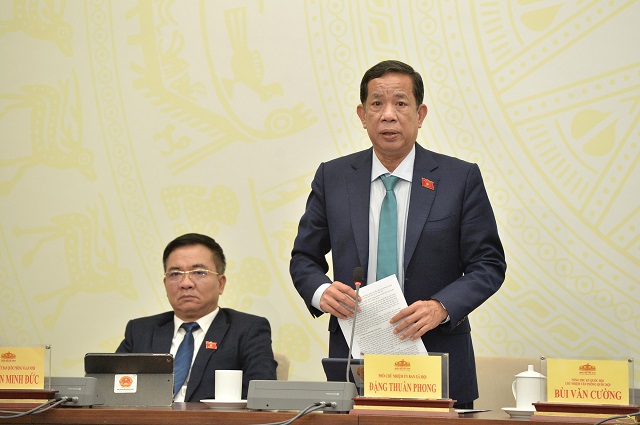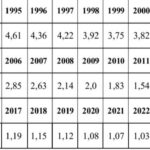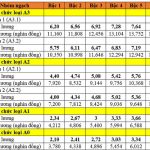Deputy Chairman of the National Assembly’s Social Affairs Committee Dang Thuan Phong shared this information at a press conference announcing the results of the 7th session of the 15th National Assembly on June 29.

Deputy Chairman of the Social Affairs Committee Dang Thuan Phong speaks
|
Mr. Dang Thuan Phong said that in previous salary adjustments, retirement pensions had been adjusted, especially with the increase in CPI indices, which had been increased many times for pensioners in accordance with the current Law on Social Insurance.
According to calculations by the Steering Committee for Salary Reform, with the cumulative increase in pensions from the previous rounds, a 11.5% increase in this round would be equivalent to a 30% increase in the base salary for officers, civil servants, and public employees.
“The Steering Committee for Salary Reform assessed that the lives of the elderly living on pensions are still difficult, so a 15% increase was considered,” said Mr. Phong, adding that while the pension adjustment was a 15% increase, in reality, with the cumulative CPI indices over the years, it would be equivalent to an increase of over 30% compared to officers and civil servants.
For officers and civil servants, as there have been multiple instances where salary increases could not be implemented, a 30% increase will be applied across the board this time.
“This is a very humane approach, prioritizing retirees”, emphasized the Deputy Chairman of the Social Affairs Committee.
Regarding the progress of salary reform in accordance with Resolution 27 of the Central Committee, many people are concerned about the three delays in completing the task. Mr. Phong informed that the Steering Committee for Salary Reform has met several times but has only completed four contents, with two contents yet to be implemented.
The Deputy Chairman of the Social Affairs Committee acknowledged that the identification of job positions lacks consistency and uniformity among ministries, sectors, and localities, even within the same field. For public service units, the self-sufficiency rate for regular expenditures is very low, so the problem of public service units cannot be solved, and the source of funding is unknown.
“Job position identification should be based on streamlining personnel, but we have not been able to do so, so we must be cautious and careful. The Government will definitely consider this comprehensively to ensure unity and effective implementation”, said Mr. Phong.
In addition, there are still many difficulties regarding allowances, as the previous 40% allowance has been reduced to 30%. If this issue is not handled uniformly, many people will be disadvantaged, especially those working in remote, mountainous, and especially difficult areas. There will also be inconsistencies and a lack of uniformity for those receiving pensions before and after July 1st.
According to Mr. Phong, a bigger issue is that more than 20 documents need to be amended to eliminate the base salary, so the Government has not been able to submit or handle it. At the same time, there is also a lack of uniformity among the forces in salary reform, so it is necessary to carefully evaluate, especially in terms of balancing resources.
According to the Deputy Chairman of the Social Affairs Committee, the Government needs to be given more time to carefully calculate personnel streamlining, job position arrangement, etc., in order to implement salary reform synchronously.
To perfect the salary reform policy, Mr. Phong stated that the Government needs to continue to carefully and thoroughly evaluate the policy to ensure feasibility, fairness, and resource availability for implementation.
Minister of Internal Affairs on salary policy reform and administrative unit arrangement
In 2024, the Ministry of Interior continues to advise on decentralization and delegation of authority, emphasizing the reorganization of the administrative apparatus. It proposes to the competent authorities the synchronized, unified, comprehensive, and effective implementation of wage policy reforms starting from July 1, 2024.
Salary of civil servants and officials before and after salary reform
Starting from July 1st, public servants and officials will have a new salary scale based on their job positions, titles, and leadership positions, replacing the current salary scale.

















